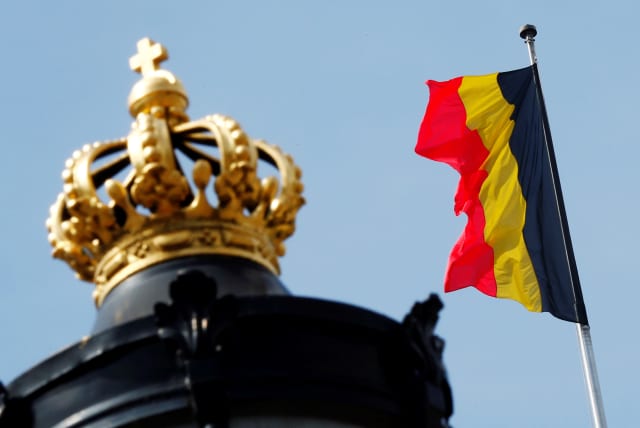Belgian NGO finds anti-Israel bias, antisemitism in local school materials revolving conflict

Amid 1000% increase of reported antisemitic incidents in the country, the report issued by IMPAC highlights the lack of a clear definition of antisemitism, and usage of polarizing materials.
In the wake of a significant surge in antisemitic incidents in Belgium following the October 7 massacre, a new study has examined how the Palestinian-Israel conflict is presented in Belgian schools.
The research, led by the Brussels-based International Movement for Peace and Coexistence (IMPAC), analyzed educational materials available for use in both the Flemish- and French-speaking communities of Belgium. It raised concerns about potential bias and polarization in the classroom regarding Jews and the Israel-Hamas War.
The study comes at a critical time, with UNIA, Belgium’s federal equality agency, reporting a 1,000% increase in antisemitic incidents in the two months following the October 7 terrorist attack, compared with similar periods in previous years. This spike in hostility has had a direct impact on Jewish pupils, with many parents reporting incidents of their children being insulted, spat at, or harassed on their way to or from school, the report said.
The study revealed systemic vulnerabilities in how sensitive topics such as the Palestinian-Israel conflict are addressed in Belgian schools. The decentralized nature of the education system, coupled with a lack of clear guidelines, leaves room for potentially biased or ideological content to enter classrooms, the report said.
It also highlighted that the presence of polarizing educational materials creates a challenging environment for Jewish pupils, with many families reportedly choosing to move their children to Jewish schools out of safety concerns, highlighting the real-world consequences of these educational shortcomings.
The report’s foreword was written by Prof. Mark Elchardus, a Belgian sociologist who carried out a study in 2010 that revealed high levels of antisemitism among Muslim youth in Brussels schools. His study found antisemitic attitudes five times more prevalent among Muslim pupils, compared with non-Muslim pupils.
In Elchardus’s foreword, he noted a stark contrast in the reception of these findings, compared with research on stereotypes affecting Muslims. The antisemitism study met with indifference or hostility, which was attributed to a mindset in which Jews are often seen as perpetrators and Muslims as eternal victims. In light of increased antisemitic violence following October 7, 2023, Elchardus emphasized the importance of examining how the Middle East conflict is discussed in schools, indicating that there is now a widespread bias against Israel and Jews.
The findings
The report illustrated how educational materials typically place all or most of the responsibility for resolving the conflict on Israel and little or none on the Palestinians or their leadership. Seventy-five percent of the sample of 52 resources analyzed contain antisemitic traits, as derived from the three main definitions of antisemitism (IHRA, Jerusalem Declaration, Nexus Statement). Israel is demonized, its Jewish population dehumanized, and its actions denigrated using terms such as apartheid, colonization, ethnic cleansing, and genocide, all uncritically, the report said.
A feature of anti-Israel antisemitism found throughout the sample was the minimization of Jewish connections to the land, such as a total absence of reference to Palestinian, Mizrahi, and Sephardi Jews. The consistent narrative was that Israelis are European Jews who colonized a historic country called Palestine, the report said.
Dozens of concrete examples of the report’s findings were featured. One of them was a Classroom Poster Project from the Flemish primary-school system in which students were asked to create posters about the conflict. The resulting posters included inflammatory statements and slogans, such as “From the river to the sea, Palestine will be free,” without providing balanced perspectives or context. This project potentially violated educational principles of neutrality and objectivity, the report said, adding that the emotive language found on this poster may have the potential to radicalize young pupils.
In addition, the study attempted to analyze history textbooks but found that due to Belgium’s decentralized education system, there are no nationally mandated textbooks. This lack of standardization makes it challenging to ensure consistent and balanced content across schools, the report said.
Many teachers in the Belgian education system rely on NGO-produced materials, most of which were found to present one-sided, pro-Palestinian narratives of the conflict, potentially reinforcing existing biases. These biases align with the political priorities of the Belgian federal Directorate General of Overseas Development, which funds these NGOs, the report said.
In its last section, the report made several recommendations, including adopting a clear, internationally recognized definition of antisemitism; developing a national action plan to combat antisemitism, with clear guidelines for teaching about complex geopolitical issues such as the Palestinian-Israel conflict; enhancing teacher-training programs to equip them with knowledge and skills needed to address sensitive topics objectively and promote critical thinking; and reviewing and standardizing of materials, including those produced by NGOs, to ensure they meet standards of objectivity and balance.
The report’s main recommendation was that Belgian authorities must conduct an official and independent investigation into the political and financial connections among the federal government, NGOs, public broadcasters, and media, which produce biased content for schools that increase hostility toward Israel and those perceived to be associated with it, particularly Jewish pupils. This should be done in the name of Global Citizenship Education, which the government is committed to supporting, the report said.
Addressing these issues is crucial not only for combating antisemitism but also for fostering an educational environment that promotes critical thinking, respect for diversity, and a nuanced understanding of complex global issues, the report said. As Belgium continues to grapple with the challenges of polarization and discrimination, the classroom remains a critical battleground in the fight against prejudice and intolerance, it said.
Jerusalem Post Store
`; document.getElementById("linkPremium").innerHTML = cont; var divWithLink = document.getElementById("premium-link"); if (divWithLink !== null && divWithLink !== 'undefined') { divWithLink.style.border = "solid 1px #cb0f3e"; divWithLink.style.textAlign = "center"; divWithLink.style.marginBottom = "15px"; divWithLink.style.marginTop = "15px"; divWithLink.style.width = "100%"; divWithLink.style.backgroundColor = "#122952"; divWithLink.style.color = "#ffffff"; divWithLink.style.lineHeight = "1.5"; } } (function (v, i) { });
